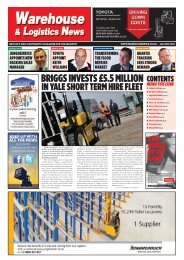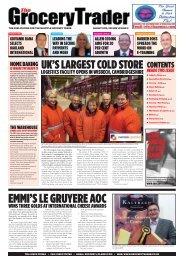Front Cover:Front Cover - Grandflame Ltd
Front Cover:Front Cover - Grandflame Ltd
Front Cover:Front Cover - Grandflame Ltd
You also want an ePaper? Increase the reach of your titles
YUMPU automatically turns print PDFs into web optimized ePapers that Google loves.
HOSPITALITYJOB HOPES RISEAMONG HOSPITALITY AND LEISURE FIRMSIt is already the worst recession on record and the hospitality andleisure industry has not been immune from the worst effects ofthe economic slowdown with businesses across the UK suffering.The industry is inevitablyparticularly vulnerable to costcuttingby cash-strapped consumersas they have to choose what they can afford.When an industry relies on discretionaryspending it has to be aware that consumershave the discretion to not spend their moneywith them. Companies have responded withdiscounts and special offers in order toensure that consumers can afford to keepspending but inevitably, when the economycontracts and consumer confidence is low, thehospitality and leisure industry will suffer.Industry analysts acknowledge that theleisure and hospitality sector is traditionally oneof the last to suffer from an economic slowdownbut also one of the last to emerge from recessionas consumer confidence tends to recover slowly.Statistics from accountants BDO StoyHayward on business failures bear this out - in2008 failures in the hospitality and leisureaccounted for around 5.6% of the total and thisyear are expected to make up 7% of the total inthe UK. Next year that proportion is set to riseto 9%, according to BDO Stoy Hayward.So far so gloomy but, of course the optimistswill say the future is bright. The £114 billion-ayearleisure and hospitality sector is a keytarget for growth, particularly with a decade ofmajor sporting events planned for the UK - the2012 Olympic Games, the 2014 CommonwealthGames, the 2015 Rugby World Cup and,possibly, the football World Cup in 2018. TheGovernment talks about a golden decade forsport in the UK and the hospitality and leisureindustry will be a major beneficiary from theseworld class events. In addition the Governmentwants to create 200,000 more jobs in the sectorby 2017, 69,000 of them managers. Of course2017 seems like a long way off when you arebattling with the effects of the recession today.That is the future but what about thepresent? Are there signs that the hospitalityand leisure industry is starting to emerge fromthe current recession?New research from Santander CorporateBanking shows that UK hospitality and leisurefirms plan to create jobs in the coming months,bucking the job-cutting trend across the UK,which has led forecasters to predict threemillion out of work by the end of the year.The bank’s study shows that one in four(24%) companies in the sector plan to increasethe number of people they employ beforeFive most confidentbusiness sectors1 Hospitality & Leisure2 Energy3 Wholesale4 Health & Medical5 AgricultureChristmas. This compares with just five per centwhich are planning to shed jobs - a positivebalance of 19 per cent - with 65 per centexpecting to maintain current staffing levels.That is encouraging particularly when youconsider that UK unemployment currentlystands at a 14-year high of 2.47 million,according to the ONS, and forecasters predictthat this will increase to a total of three millionpeople out of work by the end of 2009.The planned jobs boost would confirm signsof increasing optimism among UK hospitality& leisure SMEs, as recorded by Santander’sCorporate Banking Business Confidence Index,which shows that nine out of ten businessowners (89%) in the sector are confident in theprospects of their own business during theremainder of 2009.Around one in four (24%) firms claim to be‘very confident’ and 65 per cent say they are‘confident’. Only 11 per cent say they are ‘notvery confident’. Indeed, companies in thissector expressed the highest degree of optimismfor their prospects for the remainder of 2009 ofany sector covered by the study. Across allindustries, an average of 75% of companies saidthey were confident in their prospects.Confidence levels for companies in theindustry are driven primarily by turnover andprofitability. Turnover is the factor mostresponsible for driving confidence levels in thesector, with over one in four (29%) hospitality& leisure company owners citing this as themost important indicator for them. Turnover isfollowed by profitability (26%) and consumerspending (16%) as the most crucial indicators.It is therefore significant that hospitality andleisure companies claim to have been less affectedby falling profits in the first half of 2009 than inother industries. Across all sectors, twice as manybusinesses say that they have experienced fallingprofits than those which have enjoyed increasedprofit levels (46% against 23%). In the hospitalityBusiness sectorand leisure industry, however, this experience isreversed, with 36% seeing a rise in profits whileonly 25% have seen a decrease.Around one in ten (11%) hospitality and leisurefirms have seen their profits rise by between 10%and 20% in the six months to June 30th while thesame number have recorded a rise of more than20%. Around three per cent have seen their profitsdecrease by more than 20% while 14% recordeddrops of between 10% and 20%.It is clear that SMEs have proved remarkablyresilient throughout the recession despiteconsiderable difficulty. Santander CorporateBanking research indicates that the hospitalityand leisure sector recorded strong profits in thefirst six months of this year. It is encouraging tosee that this has driven optimism andconfidence in the sector and that companies areintending to translate this into job creation.Commenting on the research, StevePateman, Head of Santander CorporateBanking, said: “Unemployment is traditionallya lagging indicator and is expected to keeprising even when the recession is officiallyover. It would appear that smaller businesses -and particularly those with a turnover of lessthan £5 million are emerging from recessionslightly quicker than larger rivals.“It is vital that the banking sector plays itspart and helps businesses to turn job plans intoreality. The downturn has taught banks that theyneed to build stronger relationships with theircustomers in order to provide solutions that willhelp their stability and growth. Santander has aclear strategy of building its presence in the UKcorporate and commercial banking market andduring 2009 we have seen a significant increasein the number of businesses we support.”* Research conducted online among 1,049small and medium-sized businesses betweenAugust 13th and 24th 2009 on behalf ofSantander Corporate Banking by TelegraphBusiness Club. FSA42 | FOOTBALL & SPORTS ARENA | November/December 2009














